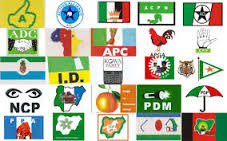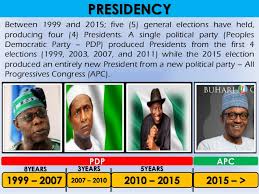History of political parties in Nigeria will never be complete if mention is not made of the various political bigwigs in the history of this country. Aside discussing the political parties in Nigeria, this write up will equally discuss about the political history of Nigeria.

The first set of political parties to be formed in Nigeria was formed in 1959, shortly before Nigeria gained her independence from Britain. The three political parties were the National Council of Nigeria and the Cameroons (NCNC). This party was led by Nnamdi Azikiwe.
The second political party was the Northern People’s Congress (NPC) and it was led by Ahmadu Bello. The party was majorly populated by the Hausa-Fulani from the North. The third one was the Action Group and it was led by Obafemi Awolowo. The party was mainly populated by the Yorubas from the southwestern part of Nigeria.
During the 1959 elections, no single party was able to win the majority. The NPC then decided to combine with the NCNC to form the national government. This brought Abubakar Tafawa Balewa in as Prime Minister and Nnamdi Azikiwe as the Governor-General on independence in 1960.
Nnamdi Azikiwe became the president of Nigeria in 1963 after Nigeria became a republic, while Tafawa Balewa maintained his position as the Prime Minister. The census conducted in 1963 was thought to favour the Hausa-Fulani more than the rest of Nigeria and this dissatisfied the Igbos, leading to the splitting of the NCNC with the NPC.
The NCNC then joined with a faction of the AG. This group was led by Obafemi Awolowo and they formed a new political party named United Progressive Grand Alliance (UPGA). The NPC on the other hand joined with the remaining faction of the AG led by Akintola to form yet another political party, the Nigerian National Democratic Party (NNDP).

The Nigeria Civil War came in 167 and ended in January 1970. This was followed by a coup de at, which led to the removal of General Gowon in 1975 and the assumption of General Murtala Mohammed to the position of president. Murtala Mohamed was killed in an unsuccessful Buka Dimka coup de ta in February 1976 and Olusegun Obasanjo took over from him.
General Obasanjo handed over power to Shehu Shagari, in 1979. Many thought Shehu Shagari did not win the election. He re-contested after his first time and also won in an election many thought was rigged against Obafemi Awolowo.
Another coup took place on December 31, 1983, which brought in Muhammadu Buhari as president. Yet another coup took place on August 2, 1985 and Ibrahim Babangida took over as president. Babangida made new constitution and planned returning the country to civilian rule.
Elections actually held in 1993 between Social Democratic Party (SDP) and National Republican Party (NRP). Moshood Abiola of the SDP won the election that was touted as the fairest and freest election ever conducted in Nigeria.
Nigeria finally returned to civilian rule after another 6 years of military rule and General Obasanjo came to power under the People’s Democratic Party on May 29, 1999. He handed over to late Umaru Musa Yar’Adua of the same political party after defeating the oppositions Action Congress (AC) and Congress for Progressive Change (CPC).
The AC won most of the states in the Southwest, while the CPC won most of the states in the Northern part of the country. The PDP swill won the majority despite this strong show of opposition. Yet another political party, the All Progressive Grand Alliance (APGA) participated in the election but was only able to win a couple of states in the south eastern part of the country.
However, Umaru Musa Yar’ Adua could not complete his first term in office. His vice, Good luck Jonathan took over and he was sworn in a second time in 2011 after winning convincingly at the polls.
Things went down the hill for Jonathan and he lost his popularity in many parts of the country, except in the southeastern and south-southern parts of the country. This led to the near-breakup of the PDP due to the exit of many of the political bigwigs of the party to the opposition parties.
In preparation for the 2015 election, the Action Congress formed an alliance with the Congress for Progressive Change (CPC) and they were joined by a faction of the APGA. They named their newly formed political party as All progressive Congress (APC).
This political party presented the former military president, Muhammadu Buhari, as flag bearer after he defeated Rabiu Musa Kwankwaso and Atiku Abubakar in the primaries.
The exodus of many members from the PDP to other political parties, especially the APC, led to the shake in the stronghold of the then ruling party. Some aggrieved PDP governors formed a faction of the political party and called it the nPDP. The nPDP were made up of 7 state governors; 5 of them later defected to the newly formed APC.
To make things worse for the PDP, some of its leaders started exiting the party and joining their lot with the new APC. Notable among them is Olusegun Obasanjo, who many saw as the main force behind the PDP. Trouble started brewing when Obasanjo resigned as the chairman of the PDP’s Board of Trustees (BOT).
Inability of the then president, Goodluck Jonathan to settle the rift led to the outright defection of Obasanjo to the APC. At that point, many concluded that Jonathan would end up being defeated at the polls.
Muhamadu Buhari of the APC was able to defeat the Goodluck Jonathan of the PDP at the polls and Muhamadu Buhari was sworn in as President on May 29, 2015. The APC is presently the ruling party, while the PDP is the main opposition party.
Other political parties that participated in the 2015 general elections aside the APC and PDP were the Labour Party, the National Conscience Party, the Hope Democratic Party, the United Progressive Party.
The Allied Congress Party of Nigeria, the United Democratic Party, the All Progressive Grand Alliance, the African Democratic Congress, the Kowa Party, the Alliance for Democracy and the Action Alliance. Among all of them, only the All Progressive Grand Alliance (APGA) could boast of winning election.
This is really helpful thanks to this platform. And please upload many other update , cause it’s really helpful I appreciate these good work.
I need the full history of the allied Congress party of Nigeria
What Are The Pre And Post Independence Political Parties Their Leaders And The Year Which They Were Formed ?
I am a Nigerian endigine, what are the history development of Nigerian parties.
MA Pls I really need ur help and my God will continue do bless you.am in school and my parents are not financially buoyant Dis is my number 08109740649.and account number 2088846457 UBA.
please publish.I am not a spammer
i own the phone number 08033143418. please